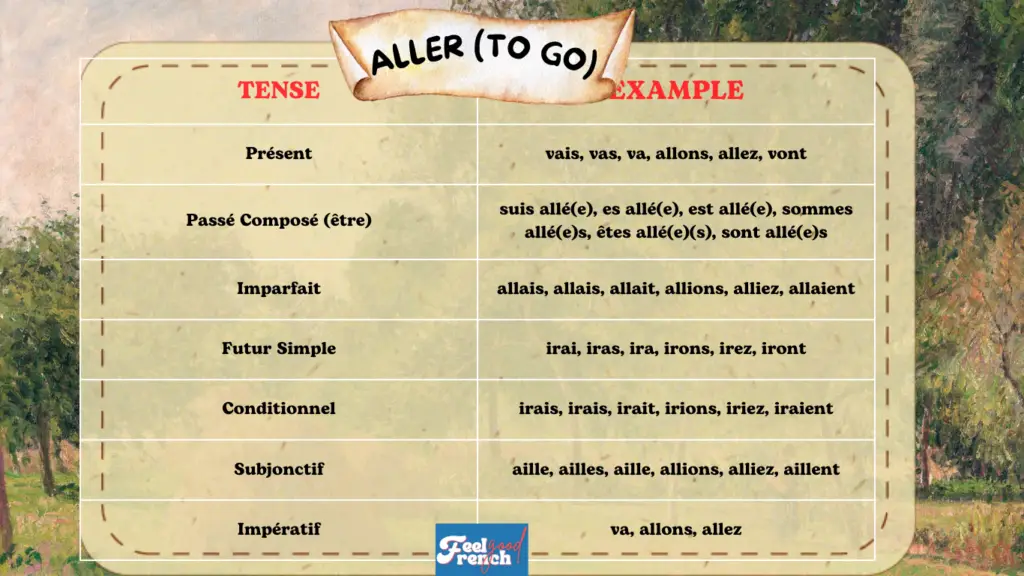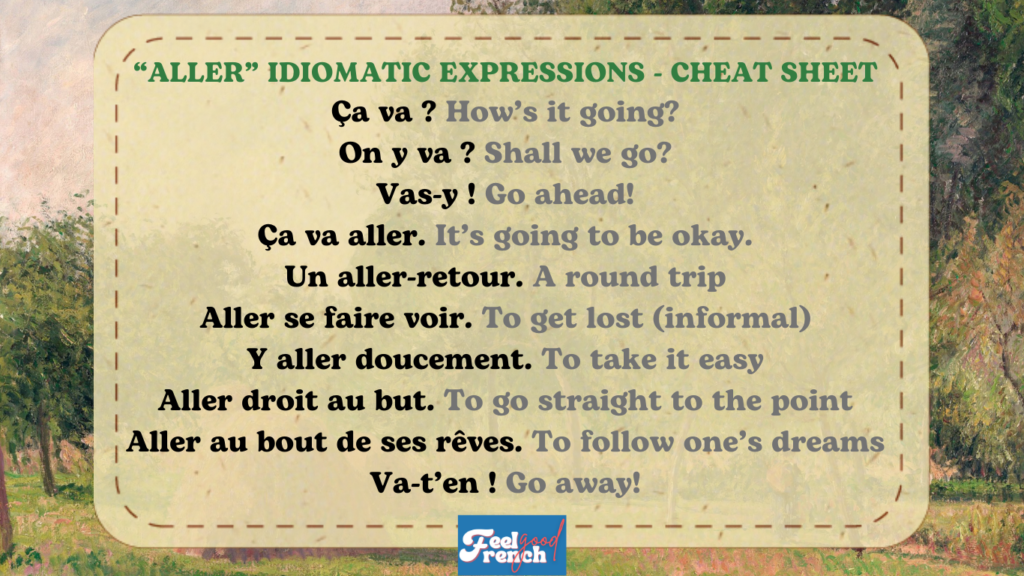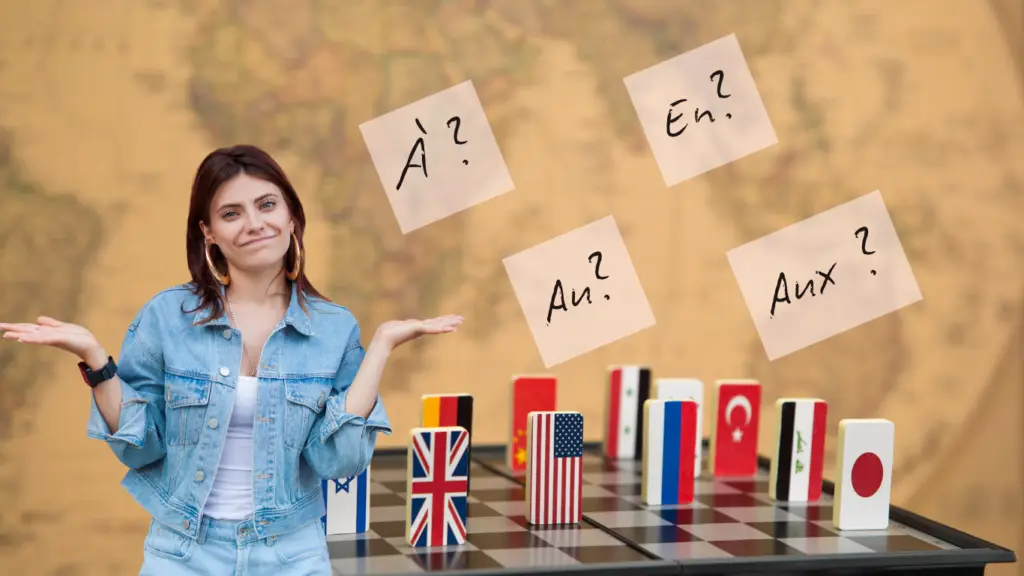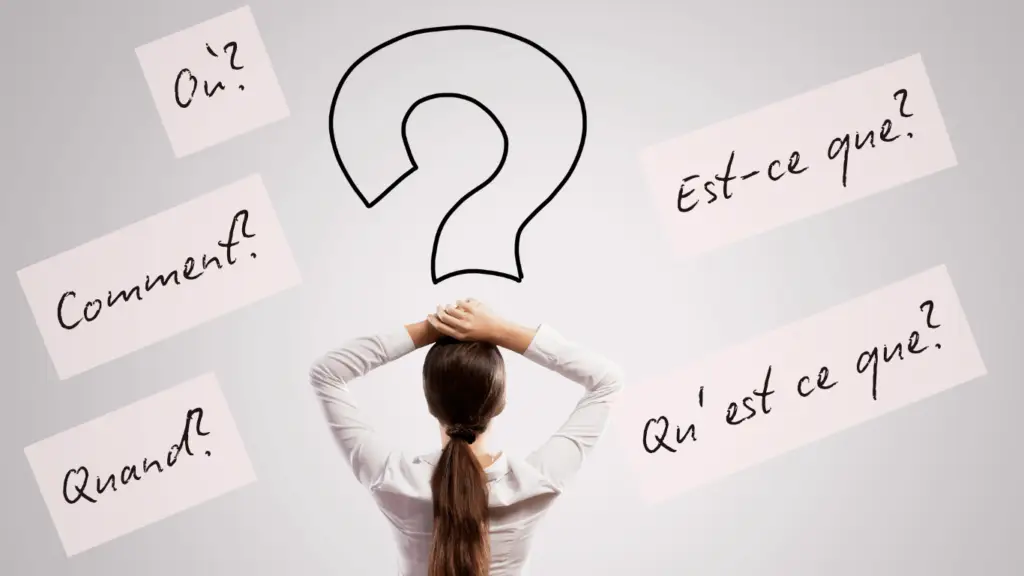The verb aller (to go) is one of the most essential and frequently used verbs in French. It ranks among the top 10 most commonly used French verbs, which makes it a must-know for anyone learning French — especially if you’re living in France or planning to retire there.
Whether you’re talking about going somewhere (Je vais à Paris), asking how someone is (Ça va ?), or forming the near future (Je vais partir demain), aller is at the heart of everyday French conversation. It’s also a key verb in informal expressions and idiomatic phrases that are part of daily life in France.
You’ve probably already heard these go-to phrases
- “Vas-y !” – Go ahead!
- “On y va ?” – Shall we go?
- “Allez les Bleus !” – Go, French team! (Cheering during football matches)
- “Ça va ?” – How’s it going?
- Complete Aller Verb Conjugation
- Eager To Learn French With an Experienced Language Coach?
- How To Say To Go in French – Aller Verb Conjugation Worksheet
- Useful Idiomatic Expressions with Aller
- 15 Real-Life Examples of Aller for Expats in France
- Common Mistakes to Avoid With Aller
- To Go in the Present Tense – Practice Exercises
- One More French Exercise on Wordwall – Aller in Present Tense
Complete Aller Verb Conjugation
To use aller confidently, you need to know how to conjugate it across different tenses. Here’s a full breakdown of aller in the most important tenses:
Aller Verb – Indicatif
| Tense | Je | Tu | Il/Elle/On | Nous | Vous | Ils/Elles |
|---|---|---|---|---|---|---|
| Présent | vais | vas | va | allons | allez | vont |
| Passé composé (with être) | suis allé(e) | es allé(e) | est allé(e) | sommes allé(e)s | êtes allé(e)(s) | sont allé(e)s |
| Imparfait | allais | allais | allait | allions | alliez | allaient |
| Plus-que-parfait | étais allé(e) | étais allé(e) | était allé(e) | étions allé(e)s | étiez allé(e)(s) | étaient allé(e)s |
| Futur simple | irai | iras | ira | irons | irez | iront |
| Futur antérieur | serai allé(e) | seras allé(e) | sera allé(e) | serons allé(e)s | serez allé(e)(s) | seront allé(e)s |
Aller Verb – Conditionnel
| Tense | Je | Tu | Il/Elle/On | Nous | Vous | Ils/Elles |
|---|---|---|---|---|---|---|
| Présent | irais | irais | irait | irions | iriez | iraient |
| Passé | serais allé(e) | serais allé(e) | serait allé(e) | serions allé(e)s | seriez allé(e)(s) | seraient allé(e)s |
Aller Verb – Subjonctif
| Tense | Je | Tu | Il/Elle/On | Nous | Vous | Ils/Elles |
|---|---|---|---|---|---|---|
| Présent | aille | ailles | aille | allions | alliez | aillent |
| Passé | sois allé(e) | sois allé(e) | soit allé(e) | soyons allé(e)s | soyez allé(e)(s) | soient allé(e)s |
Aller Verb – Impératif
| Tense | Tu | Nous | Vous |
|---|---|---|---|
| Présent | va | allons | allez |
How To Say To Go in French – Aller Verb Conjugation Worksheet

Useful Idiomatic Expressions with Aller
Aller à la rencontre de. – To go meet someone.
➡️ Il est allé à la rencontre de son ami à la gare. – He went to meet his friend at the station.
Ça va, ça vient. – It comes and goes.
➡️ L’argent, ça va, ça vient. – Money comes and goes.
Non mais ça va pas (la tête) ! – Are you out of your mind?!
➡️ Non mais ça va pas de me parler comme ça ?! – Are you out of your mind talking to me like that?!
Va-t’en ! – Go away!
➡️ Va-t’en, je suis occupé ! – Go away, I’m busy!
Un aller-retour – A round trip.
➡️ J’ai pris un aller-retour Paris-Nice. – I bought a round-trip ticket Paris-Nice.
Aller se faire voir. – To get lost (informal).
➡️ S’il n’est pas content, il peut aller se faire voir ! – If he’s not happy, he can get lost!
Aller à contre-courant. – To go against the tide.
➡️ Elle va à contre-courant de l’opinion publique. – She’s going against public opinion.
Y aller fort. – To go too far or exaggerate.
➡️ Tu y vas fort avec tes critiques ! – You’re being too harsh with your criticism!
Aller de soi. – To go without saying.
➡️ Ça va de soi que tu es invité. – It goes without saying that you’re invited.
Aller au bout de ses rêves. – To follow one’s dreams.
➡️ Il est allé au bout de ses rêves en devenant écrivain. – He followed his dreams by becoming a writer.
Y aller doucement. – To take it easy.
➡️ Il faut y aller doucement avec ce vin, il est fort ! – Take it easy with that wine, it’s strong!
Aller droit au but. – To go straight to the point.
➡️ On n’a pas de temps, allons droit au but. – We don’t have time, let’s get straight to the point.
Ça va aller. – It’s going to be okay.
➡️ Ne t’inquiète pas, ça va aller. – Don’t worry, it’s going to be okay.
Aller au lit. – To go to bed.
➡️ Il est tard, je vais aller au lit. – It’s late, I’m going to bed.
Aller chercher quelqu’un. – To go pick someone up.
➡️ Je vais chercher les enfants à l’école. – I’m going to pick up the kids from school.

15 Real-Life Examples of Aller for Expats in France
These examples focus exclusively on aller in everyday situations that expats and retirees are likely to encounter in France:
- Je vais au marché demain matin.
I’m going to the market tomorrow morning. - Nous allons à la mairie pour renouveler nos cartes de séjour.
We’re going to the town hall to renew our residency cards. - Elle va chez le médecin à 14h.
She’s going to the doctor at 2 PM. - Ils sont allés au supermarché hier après-midi.
They went to the supermarket yesterday afternoon. - Tu vas au café du coin après le déjeuner ?
Are you going to the local café after lunch? - On va faire une promenade le long de la plage.
We’re going for a walk along the beach. - Elle va chercher du pain à la boulangerie.
She’s going to get some bread at the bakery. - Je vais à la banque pour retirer de l’argent.
I’m going to the bank to withdraw money. - Il est allé à la pharmacie pour acheter des médicaments.
He went to the pharmacy to buy some medication. - Nous allons en Provence le mois prochain.
We’re going to Provence next month. - Elle irait à Nice si elle avait plus de temps.
She would go to Nice if she had more time. - Je suis allé au restaurant avec des amis hier soir.
I went to the restaurant with some friends last night. - Tu vas voir ce film ce soir ?
Are you going to see that movie tonight? - Il va souvent chez le coiffeur.
He often goes to the hairdresser. - On va à la plage demain matin.
We’re going to the beach tomorrow morning.
Sign Up for the Feel Good French Newsletter
Common Mistakes to Avoid With Aller
- Incorrect: J’ai allé à la plage. → Correct: Je suis allé à la plage. (Aller takes être in the passé composé.)
- Incorrect: Je vais à Paris hier. → Correct: Je suis allé à Paris hier. (Use passé composé for completed past actions.)
- Incorrect: Il va faire beau hier. → Correct: Il faisait beau hier. (Use imparfait for weather descriptions in the past.)
To Go in the Present Tense – Practice Exercises
1. Complete the sentences with the correct form of aller
- Nous __________ au marché demain matin.
- Tu __________ chercher du pain maintenant ?
- Il __________ chez le médecin demain matin.
- Vous __________ souvent à la plage ?
- On __________ voir un film ce soir.
- Elle __________ faire une promenade après le déjeuner.
- Je __________ à la boulangerie avant le dîner.
- Ils __________ en vacances la semaine prochaine.
- Tu __________ au travail en bus ou à pied ?
- Nous __________ dîner chez des amis samedi soir.
- Il __________ à la pharmacie cet après-midi.
- Je __________ chercher un colis à la poste.
- Elles __________ à la piscine après l’école.
- On __________ se promener après le dîner.
- Vous __________ à la réunion demain matin ?
2. Complete the dialogue using aller
A: Tu fais quoi ce soir ?
B: Je __________ voir un concert avec Sophie.
A: Ah, sympa ! Tu sais à quelle heure vous __________ y aller ?
B: Vers 20h, je pense. Mais Sophie __________ passer chez moi avant.
A: OK. Et après le concert, vous __________ prendre un verre ?
B: Peut-être. Si on n’est pas trop fatigués, on __________ au bar du coin.
A: Bon, amuse-toi bien ! Moi, je __________ au cinéma avec Claire.
One More French Exercise on Wordwall – Aller in Present Tense
Don’t worry… Ça va aller!
Mastering aller is more than just memorizing conjugation tables — it’s about making it part of your everyday conversations. When you understand how to use aller naturally, it opens the door to smoother, more confident interactions in French. Whether you’re asking “Ça va ?”, making plans, or giving directions, aller will become one of the most versatile tools in your French toolkit. And if you want to go further and learn more French grammar visit my latest post about How to Make Questions in French. Keep practicing — ça va aller!

Why “-ent” Is Silent in French Verbs (and Why That Matters)
If you’re an expat learning French, you’ve probably seen verbs ending in -ent and wondered…
How to Say “To Go” in French | Aller Verb Conjugation
The verb aller (to go) is one of the most essential and frequently used verbs…
French Sentences: Why You’re Getting Adjective Order Wrong (And How to Fix It)
Learning to place adjectives correctly in French sentences can be one of the most confusing…
Think You Know French Prepositions? À, En, Au, and Aux Might Surprise You!
“Je vais à Nice, en France, au marché… et aux urgences?” French prepositions of place…
How to Use French Question Words Correctly (Without Sounding Awkward!)
Asking questions in French can feel tricky, especially because there are several different ways to…
French Past Tense – Imparfait vs Passé Composé: No More Confusion
“Hier, j’ai vu un film au cinéma.” → A specific event, completed action → passé…






